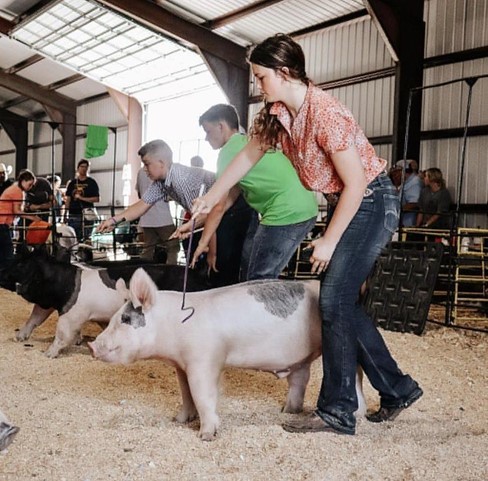FFA sees success in 2022; wastewater residuals cause a stir
The Cassville area is well-known for its agriculture, and along with the successes of the FFA program last year, some regional ag leaders changed, and reports of wastewater residual use on county farms became an ongoing discussion.

An industrial waste lagoon located about two miles southwest of Fairview, is one of two constructed in and near Newton County by Denali Water Solutions, a national “organic residuals management company,” with offices in Russellville, Ark. Sheila Harris/Special to the Cassville Democrat
Cassville FFA
Jordan Ellis, Cassville agricultural teacher and FFA advisor, said during the spring of 2022, many of the local FFA students worked hard to prepare their animals for the summer show season, and over the summer, they showed that their hard work and dedication to their animals has paid off.
“All of our students have had many successes in every show ring they’ve entered,” he said. “Some of their accomplishments include:
• Tierany Sloan with the Grand Champion Market hog and the Supreme Champion Gilt
• Jaret Hinson with the Reserve Grand Champion Market Hog, Champion Poland, and Reserve Supreme Breeding Gilt
• Peter Littlefield with the Grand Champion Market Lamb, Supreme Ewe, and the Grand Champion Limousin Heifer
• Dakota Bowen with the Reserve Grand Champion Market Lamb, Champion Ram, and the Champion Dorper Ram
• Langston Mitchell with the Grand Champion Steer
• Rylee Yerge with her Reserve Grand Champion Holstein Heifer
• Landen Smith with the Best of Breed Fancy Fowl
• Andrew Gray with his Best of Breed Fancy Fowl
• Hailey Bowen with her Supreme Bull and Champion Beefmaster Heifer
• Timothy Hudson with his Champion Crossbred Boar
• Elizabeth Ray with the Champion Spot Boar and the Champion Spot Gilt
• Caleb Leach with the Best of Show Rabbit
“We have several great showmen in our chapter and lots of younger kids that are already making us proud.”
Ellis said he would like to congratulate all future, present, and past members of the Cassville FFA chapter for their continuous hard work and success at all the fairs this summer.
“The most important part of student involvement in FFA is that we offer something for every student,” he said. “Most think we are just agriculture, however agriculture is our basis, but we teach leadership, public speaking, responsibility, work ethic, self motivation, problem solving, among other things as well.”
Ellis said he grew up in Cassville and was an FFA member himself, and so was Mr. Hinson.
“Both of us were past chapter presidents of the Cassville FFA, so we both have a special bond with this chapter and want to see it continue to grow and succeed,” he said. “When I encourage students to join FFA I tell them that if they want new and exciting opportunities to learn, grow, and diversify themselves in many ways this is the organization for them.
“We get to travel across the nation and sometimes overseas meeting other FFA members and learning new culture. The FFA offers something for everyone, whether they are directly interested in agriculture or not.”
Ellis said FFA is the largest youth organization in the world with over 735,000 members.
“We are very excited for the upcoming school year to introduce our third teacher, Hannah Denief, who will be teaching both in the High School and the Middle School” he said. “Also, we will be taking our students out to our new school farm ‘Wild C research farm’ to learn diverse agriculture techniques and practices.”
Free fertilizer causes a stir
During a time when fertilizer prices have almost tripled, Denali Water Solutions — a company in Arkansas that specializes in “organic residuals waste management” — has been offering free, land-applied fertilizer to farmers and ranchers in southwest Missouri.
The problem is, nobody is certain exactly what’s in the mix at any given time.
“I’m not sure whether the stuff they’re offering even is fertilizer,” said Caleb Wardlaw, who owns a farm alongside a tributary of Mike’s Creek in Thomas Hollow, near the Barry-McDonald County line.
Denali Water Solutions, a national firm with offices in Russellville, Ark., recently constructed two large lagoons in and near Newton County for the purpose of storing industrial and municipal waste. Those “residuals,” as Denali labels them on their website, refer to the refuse and offal from the facilities with whom Denali holds fertilizer distribution permits in the state of Missouri. According to the website of the Missouri Fertilizer Control Board, that number currently stands at 81. The majority of the entities with whom Denali contracts are located in states outside of Missouri. Thirty are in Arkansas. Recognizable names include Tyson Foods in multiple locations and the municipal waste facility for the city of Bentonville, Ark.
The first storage lagoon, with an approximate 2 million-gallon capacity, according to a recent report, was constructed in 2020, and is located two miles southwest of Fairview. The second one, similar in size, was constructed in the past year and is situated approximately five miles southwest of Stella. Neighbors were first alerted to the purpose for the lagoons by the “rank odor” emanating from them when the contents are stirred by deposits or withdrawals. It’s a smell that can’t be masked, even inside his house, said Sean Priest, who lives a half-mile northeast of the lagoon near Fairview.
“I’m more worried about the safety of my family’s drinking water, though,” said Priest, who sources his water from a private well.
Wardlaw, who holds a degree in Aquatic Resources and Marine Biology, echoes Priest’s sentiment.
The way the stuff they’re calling fertilizer smells, I don’t want it anywhere near my drinking water or in the creek near my house,” he said.
Heather Peters, with the Watershed Protection Section of the Missouri Department of Natural Resources (DNR), says the general categories of ingredients in the Denali lagoons are “waste from meat and dairy processors, ingredients and preservative manufacturers, pet and animal food manufacturers, other food processors, and wastewater and/or biosolids from a few municipalities.”
“Domestic wastewater treatment facility biosolids must meet all federal requirements,” she said.
Her words offer scant consolation to Wardlaw, since Peters also says land-application of the turbid mix from the Denali lagoons (biosolids or none) is not part of the DNR Watershed Protection Section’s jurisdiction — even in areas with impaired waterways.
While the Denali storage lagoons constructed in Newton County are a recent development in southwest Missouri, the land-application of their out-of-state contents has resulted in finger-pointing between regulatory agencies in Jefferson City.
“When a company like Denali, a non-point source, acquires a fertilizer distribution permit from the Missouri Fertilizer Control Board (MoFCB), with ingredients licensed by that board, they’re eligible for a fertilizer exemption from the DNR,” Peters said.
Peters said such exemptions extend to the storage, land-application and transporting of waste products (labeled as fertilizer) that companies may engage in after they receive distribution permits from the MoFCB.
Most farming operations, because of the diffuse nature of their fertilizer applications, are considered non-point sources of possible water pollution, Peters explained.
“Point sources,” on the other hand, she explained, have discharge points of possible water contaminants and are required to maintain discharge permits and meet the land-application regulations of the DNR. Examples include established chicken processing plants and established municipal wastewater facilities that operate in Missouri.
The established storage lagoons of Denali Water Solutions, now present in Missouri and containing out-of-state refuse, do not meet that DNR criteria, because the company has fertilizer distribution permits from the Missouri Fertilizer Control Board.
The Missouri Fertilizer Control Board is a 501c3 entity formed by legislative committee in 2016 to promote the fertilizer industry and oversee the administration of the Missouri Fertilizer Law. Before 2016, the state’s fertilizer program was under the auspices of the University of Missouri, said program director, Steve Taylor.
The Missouri Fertilizer Program, Taylor says, is called a “nature conservancy” and is funded by contributions, grants and the permit and tonnage fees that fertilizer distributors pay to transport fertilizer in Missouri.
When it comes to issuing fertilizer distribution permits to prospective distributors like Denali, Taylor says he feels like his hands are somewhat tied.
“The fertilizer law says that the presence of nitrogen, phosphorus or potash qualifies a substance as a fertilizer,” he said. “So, if one of those is present, we feel obligated to give a company a fertilizer distribution permit, provided that the other ingredients are not pollutants.”
After clean reports from test samples are presented, the ingredients themselves are licensed by the fertilizer board. A company then becomes eligible for a fertilizer exemption from the DNR, an exemption which includes the land-application of the ingredients, said Peters.
When the nutrients themselves present a potential threat to waterways, the scenario becomes murky. Several waterways in the Elk River Watershed Basin — including Indian Creek, near where the Denali lagoons are located, and the confluence of Big and Little Sugar Creeks, near Caleb Wardlaw’s farm — were reported as “Nutrient Impaired” by the DNR as early as 2004. According to the report, the impairment by nitrogen and phosphorus was due, the DNR believed, to the proliferation of poultry farming in the area.
An excess amount of nutrients in soil, say scientists, can easily reach waterways through the myriad of fissures, sinkholes, caves and losing streams comprising southwest Missouri’s karst topography. There, they can cause an overgrowth of aquatic plant life and a deficit of oxygen in fish and wildlife. An excess of nitrogen (nitrates) in drinking water can adversely affect infants, pregnant women and otherwise vulnerable adults.
Peters says that “Better Management Practices” for the use of land are available to farms in Missouri that are classified as non-point sources of possible water pollution, but that compliance with those practices is voluntary.
“Even in areas of impaired waterways,” she added.
Arkansas, by comparison, is tightly regulated.
In 2003, Arkansas General Assembly labeled a large portion of northwest Arkansas as a “Nutrient Surplus Area,” due to the proliferation of poultry farming there. The Arkansas Natural Resources Commission took immediate steps to protect area waterways from the excess by tightening the regulations for fertilizer land application — including the disposition of organic materials such as animal waste and crop debris.
In spite of the role that the Missouri Fertilizer Control Board plays in the permitting and licensing of fertilizer ingredients and distributors, Steve Taylor believes, according to law, that the MoDNR has the final authority in water quality issues.
Peters, however, says the Fertilizer Control Board is ultimately responsible for permitting the products which may end up in Missouri waterways, including in those known by the DNR to be impaired by nutrients.
“If visible run-off or discharge shows up in waterways, then we will investigate further,” Peters said.
Wardlaw hopes it doesn’t come to that.
“I’m not saying anybody’s doing anything wrong,” he said. “I just want to catch a potential problem, before it becomes a bigger one.”
Meanwhile, the differences in regulatory practices between Missouri and Arkansas, coupled with the apparent impasse at the state level between the MoFCB and the DNR, make it appealing for Denali Water Solutions and other out-of-state companies to haul out-of-state waste into Missouri and land-apply it in the name of fertilizer, unhampered.
Chris Hammen, rural Purdy farmer and business owner, says he understands why area farmers might be accepting the offers of free fertilizer from Denali, although he hasn’t been offered any himself.
“Fertilizer prices have tripled in the last few months, which is making things difficult for farmers, so hopefully what’s being offered [by Denali] is a good deal and not harmful,” he said.
Hammen said he would want to get any free fertilizer checked out before he used it, though.
“I hope other farmers and ranchers feel the same way,” he said. “I don’t want to do anything that would harm the future production of my land.”
Peters advises residents with concerns about their private well water to contact their local health departments.
Larry Bergner, administrator of the Newton County Health Department, says his office checks well water samples for two types of bacteria: coliform and e-coli; and for the presence of three metals: lead, cadmium and zinc.
According to Kimberly Scritchfield, the Environmental Public Health Specialist for the Barry County Health Department, her office offers several well-water test options, including a total coliform test for $20, which checks for e-coli; a nitrate test for $5; and a “new well” series for $30, which includes extensive testing for metals, chemicals and nitrates.
Bergner recommends that residents with concerns [about water safety in regard to fertilizer application] contact their elected state representatives and senators to find out where regulatory gaps might exist, so they can be resolved.
“Nobody would want elements introduced into a water source that could potentially harm fish, wildlife and humans,” he said.
Jay Chism named Extension Center director
Jay Chism joined the Southwest Research, Extension and Education Center (SW-REEC), as director of one of the four research, extension and education centers of the Missouri Agricultural Experiment Station in the College of Agriculture, Food and Natural Resources (CAFNR).
The appointment became effective Jan. 24, 2022. Chism is no stranger to the southwest Missouri area, as he has served as the Southwest Regional Director for University of Missouri Extension for the past nine years.
Chism will help direct unique research, Extension and education opportunities at the Center, located in Mt. Vernon. The SW-REEC covers more than 22 counties addressing many different agricultural industries such as beef, forage and horticulture.
Chism’s background is in horticulture and agronomy. He received his bachelor’s degree from Missouri State University and attended the University of Missouri for his master’s in horticulture. Chism currently works for University of Missouri Extension as the Southwest Regional Director. In addition to his current role, Chism worked as an agronomy specialist for MU Extension. His family also operated a horticulture business near Joplin for more than 17 years prior to working for the University.
Chism stated that CAFNR’s strategic plan, Drive to Distinction, provides an excellent shared vision for all of CAFNR.






